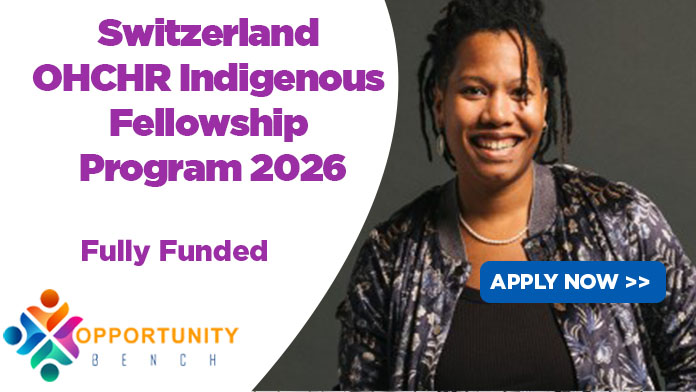The Switzerland OHCHR Indigenous Fellowship Program 2026 represents a transformative opportunity for indigenous leaders and activists to gain specialized human rights training at the heart of international diplomacy. Administered by the Office of the United Nations High Commissioner for Human Rights (OHCHR), this prestigious fully-funded program empowers indigenous representatives with the knowledge, skills, and networks to effectively advocate for their communities’ rights on global platforms.
This intensive fellowship program takes place primarily in Geneva, Switzerland, the epicenter of international human rights mechanisms. Over the course of four months, participants engage directly with UN human rights bodies, including the Human Rights Council, Expert Mechanism on the Rights of Indigenous Peoples (EMRIP), and Special Procedures. The program combines rigorous academic training with practical advocacy experience, covering critical areas such as international human rights law, treaty body reporting, and effective engagement with UN mechanisms.
Beyond formal training, fellows benefit from unparalleled networking opportunities with indigenous leaders from around the world, UN officials, and human rights experts. The program specifically targets indigenous individuals who are actively involved in promoting and protecting the rights of their communities at local, national, or regional levels. This comprehensive guide provides detailed information about the fellowship structure, eligibility criteria, financial benefits, application process, and strategic tips to strengthen your application for this life-changing opportunity.
Fellowship Description
The OHCHR Indigenous Fellowship Program 2026 is a fully-funded initiative designed to build the capacity of indigenous human rights defenders:
- Funding: Fully Funded (all costs covered)
- Host Institution: United Nations Office at Geneva
- Program Level: Professional Training Fellowship
- Focus Areas:
- International human rights instruments
- UN mechanisms for indigenous rights
- Advocacy and lobbying techniques
- Human rights documentation and reporting
- Duration: 4 months (typically May-August 2026)
- Eligible Candidates: Indigenous activists and community leaders
- Host Country: Switzerland
- Application Deadline: September 30, 2025 (for 2026 intake)
Benefits Summary of the OHCHR Indigenous Fellowship 2026
This comprehensive fellowship package includes:
- Full Financial Support:
- Round-trip airfare from home country to Geneva
- Monthly living allowance covering all basic expenses
- Accommodation in Geneva for program duration
- Professional Development:
- Specialized training on UN human rights mechanisms
- Direct engagement with UN treaty bodies and Special Rapporteurs
- Workshops on effective advocacy strategies
- Logistical Support:
- Swiss residence permit for program duration
- Health insurance coverage
- Local transportation pass in Geneva
- Networking Opportunities:
- Access to UN human rights events and sessions
- Meetings with indigenous rights experts
- Alumni network connections
Detailed Eligibility Criteria
1. Indigenous Identity Requirements
- Must belong to a recognized indigenous community
- Must provide documentation of indigenous affiliation
- Preference given to those actively working with indigenous organizations
2. Professional Experience
- Minimum 2 years experience in indigenous rights advocacy
- Demonstrated community leadership role
- Clear plans to apply knowledge in home community
3. Language Requirements
- English OR French proficiency (program conducted bilingually)
- Basic understanding of Spanish advantageous but not required
4. Additional Requirements
- Letter of support from indigenous organization
- Clear articulation of learning objectives
- Commitment to knowledge transfer post-fellowship
Program Components
The fellowship consists of three core phases:
- Orientation Phase (2 weeks):
- Introduction to UN human rights system
- Overview of key indigenous rights instruments
- Skills assessment and learning plan development
- Core Training Phase (3 months):
- Intensive workshops on:
- UNDRIP implementation
- Engaging with treaty bodies
- Human rights documentation
- Attendance at UN human rights sessions
- Practical advocacy exercises
- Intensive workshops on:
- Application Phase (2 weeks):
- Development of action plan for home community
- Presentation of learned concepts
- Networking and follow-up planning
Comprehensive Application Process
Step 1: Pre-Application Preparation
- Consult with indigenous community leaders
- Identify specific learning needs
- Gather required documentation
Step 2: Document Compilation
- Required Documents:
- Completed application form
- Personal statement (500-700 words)
- Letter of recommendation from indigenous organization
- Proof of indigenous affiliation
- Curriculum vitae/resume
- Language proficiency evidence (if available)
Step 3: Submission and Review
- Applications submitted via OHCHR online portal
- Initial screening by OHCHR staff
- Review by indigenous experts committee
Step 4: Selection Timeline
- October-December 2025: Application review
- January 2026: Interviews (virtual)
- February 2026: Notification of results
- April 2026: Pre-departure preparations
- May 2026: Program commencement
Strategic Application Tips
- Community Alignment:
- Clearly demonstrate how the fellowship will benefit your community
- Show existing community engagement
- Include specific examples of past advocacy work
- Learning Objectives:
- Identify precise knowledge gaps to address
- Link to current community challenges
- Show realistic application plans
- Recommendation Letters:
- Choose referees who can speak to your indigenous leadership
- Ensure letters address your potential impact
- Include organizational letterhead where possible
Frequently Asked Questions
1. Can family members accompany fellows?
No, the program does not provide support for dependents.
2. Is age a limiting factor?
No, applicants of all ages are considered based on merit and community role.
3. What happens after the fellowship?
Fellows join a global alumni network and commit to sharing knowledge.
4. Are non-indigenous allies eligible to apply?
No, this program is specifically for indigenous individuals.
The OHCHR Indigenous Fellowship Program 2026 offers an unparalleled opportunity for indigenous rights defenders to gain critical skills and access international platforms. With its comprehensive support and prestigious UN setting, this program can significantly enhance your ability to advocate for your community’s rights.
Begin preparing your application early to maximize your chances of selection.

